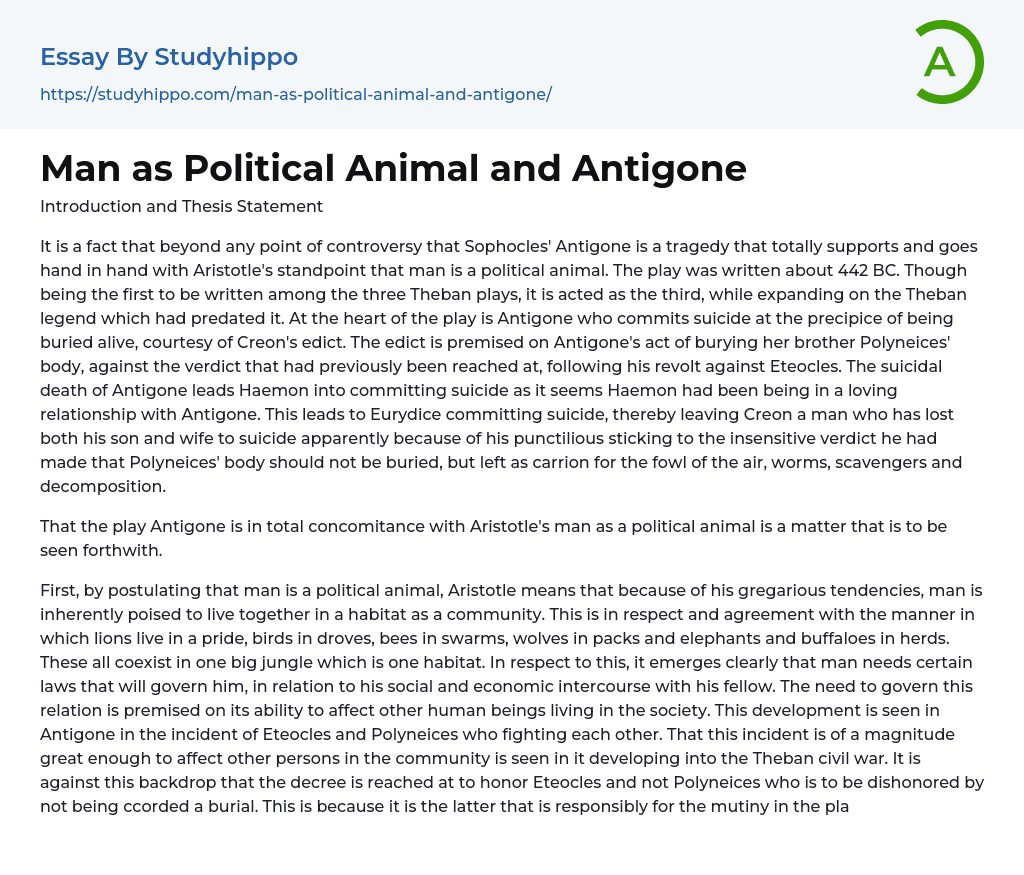The play Antigone by Sophocles, written in 442 BC, perfectly exemplifies Aristotle's belief that humans are political beings. Despite being the first of the Theban plays to be written, it is performed as the third and builds upon the existing Theban legend. At its core is Antigone, who chooses death over being buried alive according to Creon's decree. This decree arises from Antigone's act of burying her rebellious brother Polyneices against a previous ruling. Antigone's suicide leads her lover Haemon to also take his own life. Consequently, Eurydice takes her own life as well, leaving Creon bereft due to his unyielding commitment to the insensitive decree that Polyneices should remain unburied.
Antigone clearly aligns with Aristotle's concept of humans as political creatures because he argues that mankind's social nature compels them to live within communities. Just as lions form pri
...des, birds gather in flocks, bees form swarms, wolves create packs, and elephants and buffaloes move in herds; humans too require laws to govern their social and economic interactions with others. These laws are necessary because they have the potential to impact other individuals within society.The play Antigone illustrates the concept through the conflict between Eteocles and Polyneices, which leads to the Theban civil war. In response, a decree is issued to honor Eteocles but dishonor Polyneices by denying him a proper burial. The severity of this decree ultimately prompts disobedience. It is crucial to acknowledge that punishment itself is not inherently wrong; it is the excessively harsh and inhumane nature of the decree that sparks resistance. Moreover, man's political nature becomes evident as he assesses and evaluates his actions, comprehends their purpose and consequences, and take
appropriate measures. Similarly, animals exhibit a similar instinctual sense of reconnaissance before embarking on a mission, albeit on a more instinctive level. For example, hyenas will only attempt to steal prey from lions when part of a large pack. Smaller animals always yield to the "big five" - lions, leopards, elephants, buffalos, and rhinoceroses - when they approach rivers due to past experiences or instinctual appraisal. In Antigone, the ruling class in Theban society attempts to control lawlessness by imposing strict deterrent measures against any potential rebellion and punishing Polyneices. Although this endeavor fails, it serves as a reminder to the people of Thebes that political rebellion is a grave offense.The play Antigone directly relates to Aristotle's belief that humans are political creatures, as both animals and humans can form communal groups to achieve common goals. Whether it is a pride, herd, bask, or swarm, animals thrive when acting together in large numbers. Similarly, the fate and political direction of a state or country are determined by the collective action of its citizens as the body politic. This is particularly clear in situations where a plebiscite is necessary for making political decisions. The story of Antigone serves as an example of this concept since only a few individuals - Antigone, Eurydice, Haemon, and Tiresias - attempt to dissuade Creon from his cruel verdict. If the entire population had united against Creon's decision, they could have reversed Polyneices' punishment and prevented the tragic deaths of Queen Eurydice and Prince Haemon. Like animals, human beings always operate under leadership guidance. Matriarchal or patriarchal systems exist both in animal communities and human societies; for instance, the Mayan civilization
demonstrates this duality. Despite cultural differences and historical contexts, leadership among human beings has always been evident regardless of whether it's African ascephalous states or centralized European states.Jean Jacques Rousseau's Social Contract Theory illustrates the concept that individuals possess ultimate sovereignty but willingly give it to the state through a social contract. In turn, the state can enforce necessary laws for societal well-being and order. However, residual sovereignty remains within the community, enabling them to participate in universal suffrage and elect competent leaders who reject corruption and oppression. The play Antigone exemplifies a leader's role in upholding or disregarding the law, regardless of their actions being wise or reckless. Additionally, humans coexist within an environment with limited resources, similar to animals. This scarcity plays a crucial part in the social contract as it fuels conflicts such as the war between Polyneices and Eteocles depicted in Antigone. Furthermore, politics entails a struggle for power while also encompassing the ability to seize and allocate economic values discreetly within this struggle.
- Rabbit essays
- Distribution essays
- Large Animals essays
- Mouse essays
- Poultry essays
- Animal Abuse essays
- Cats Vs Dogs essays
- Cattle essays
- Territory essays
- Appeal essays
- Revenge essays
- Corporate Governance essays
- Public Service essays
- Income Tax essays
- Supply essays
- Red Cross essays
- Democracy essays
- State essays
- Liberty essays
- Absolutism essays
- Reform essays
- Republic essays
- John Marshall essays
- Bourgeoisie essays
- Developed Country essays
- Elections essays
- International Relations essays
- Left-Wing Politics essays
- Monarchy essays
- Political Corruption essays
- Political Party essays
- Political Science essays
- Sovereign State essays
- United Nations essays
- World Trade Organization essays
- Contras essays
- Dictatorship essays
- Foreign policy essays
- Monarch essays
- Corruption essays
- Foreign essays
- Democratic Party essays
- European Union essays
- President Of The United States essays
- John Stuart Mill essays
- Terrorism essays
- Military essays
- Social Security essays
- Federalism essays
- Gentrification essays




